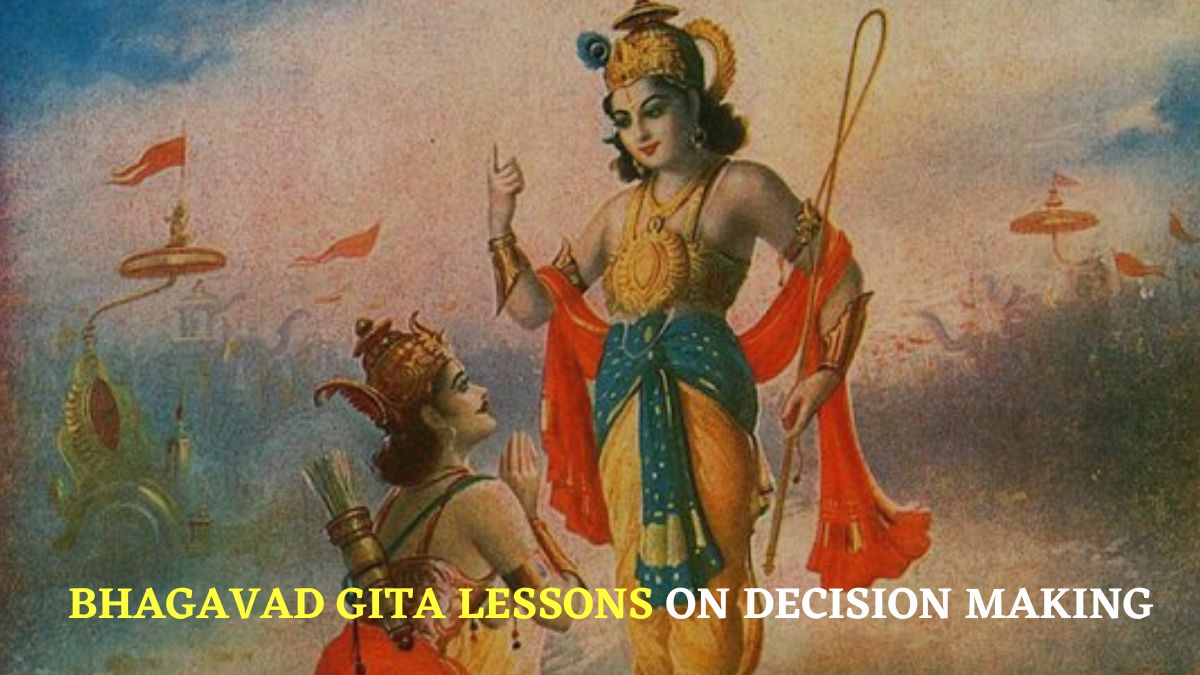- By Kashish Rai
- Sun, 10 Sep 2023 07:49 PM (IST)
- Source:JND
Each of us must make a decision at some point in our lives. We make a lot of decisions every day. The present scenario is a result of decisions that may have been made in the past. Additionally, the choice one makes today will determine who they are tomorrow. One excellent decision can elevate a person to the top position, while one bad choice might land one in the most dire circumstances imaginable. It can be a challenge to make the right choices. One can take the help of the Bhagavad Gita to find answers to the most complex questions because it is not a religious book but a manual of life. Through his dialogues, Lord Krishna has resolved all the queries of warrior Prince Arjuna in the Bhagavad Gita that helped him win on the battlefield of Kurukshetra. Let us go through some of the lessons on better decision-making inspired by the Bhagavad Gita further.

Bhagavad Gita Lessons On Decision Making
1. Yoga-stah kuru karmani sangam tyaktva dhananjaya,
Siddhy-asiddhyoh samo bhutva samatvam yoga ucyate
“Perform your duty equipoised, O Arjuna, abandoning all attachment to success or failure. Such equanimity is called yoga.” (Bhagavad Gita Chapter 2, Verse 48)
Lord Krishna teaches us to make the right decision to carry out one’s obligations without expecting praise. Do not become dependent on reward and do not demand the results of your deed. Create a calm disposition toward outcomes that could go either way. Avoid moving forward with new tasks before the prior ones have been acknowledged. The majority of the time, waiting for outcomes is useless and merely wastes time and opportunity.
2. Sukha-duhkhe same krtva labhalabhau jayajayau,
Tato yuddhaya yujyasva naivam papam avapsyasi
“Fight because you must, without heeding feelings of happiness or distress, possibilities of loss or gain, victory or defeat….” (Bhagavad Gita Chapter 2, Verse 38)
Serving the greater good while pursuing the appropriate aim is always the best. Never reason on the basis of emotions or sensations. As long as our instinctual emotions continue to make decisions for us without any conscious effort on our part to make moral choices, we will continue to pass up the opportunity to develop into better versions of ourselves.
3. Bhogaisvarya-prasaktanam tayapahrta-cetasam,
Vyavasayatmika buddhi samadhau na vidhiyate
“Those who are attached, enamoured by sense pleasures and material opulence, will be unable to resolutely commit to service.” (Bhagavad Gita Chapter 2, Verse 55)
The Gita warns against limiting ourselves to the limited realm of our personal pleasures and wasting our enormous ability to cheer up millions of people.

4. Klaibyam ma sma gamah partha naitat tvayy upapadyate,
Ksudram hrdaya-daurbalyam tyaktvottishtha parantapa
“Do not give into this degrading impotence that is unbecoming of you, son of Partha. Give up the petty weaknesses of the heart and arise.” (Bhagavad Gita Chapter 2, Verse 3)
The Bhagavad Gita encourages us to have the fortitude to act to carry out the "right" thing. Continue doing your responsibility in the face of countless obstacles because the cost of neglecting it is too high. It is more frightening to feel intimidated by the repercussions of taking the 'correct action' than to stand up and fight regardless. If you keep doing this, soon you will be unstoppable no matter how many disadvantages are placed in your path.
5. Karmanyevadhikaras te ma phalesu kadacana,
Ma karma-phala-hetur bhur ma te sango stv akarmani
“You have the right to perform your prescribed duty, but don't cultivate a sense of entitlement for the fruits of your action. Never think you alone are the cause of results and never get attached to not doing your duty.” (Bhagavad Gita Chapter 2, Verse 47)
The Bhagavad Gita advises going one step further after finally making the right decision and carrying it through against all circumstances. Do not worry about the results of that altruistic deed.

